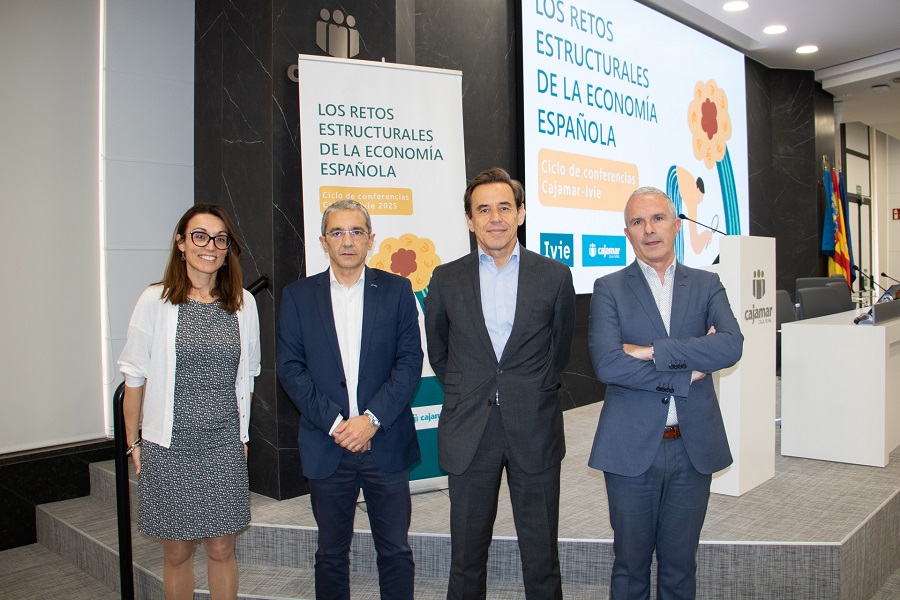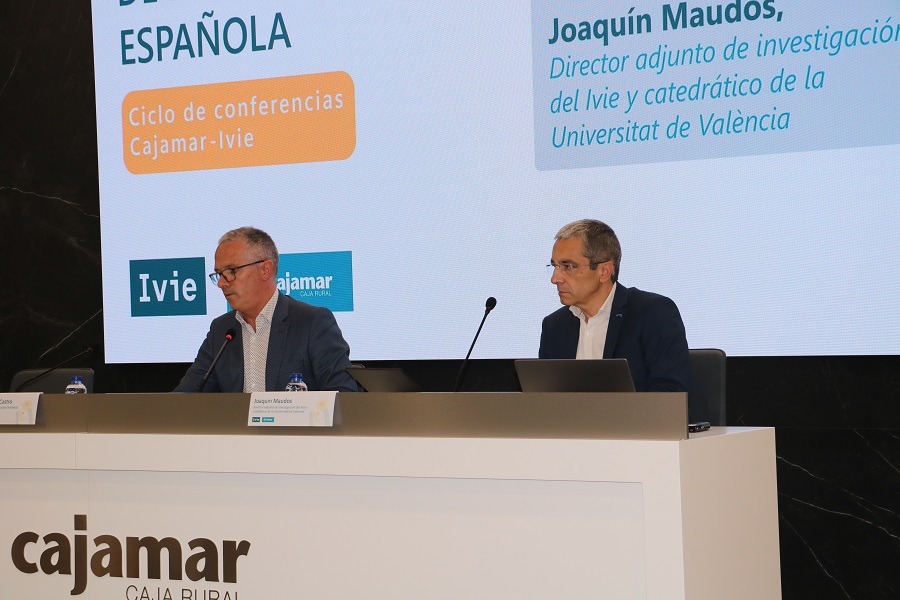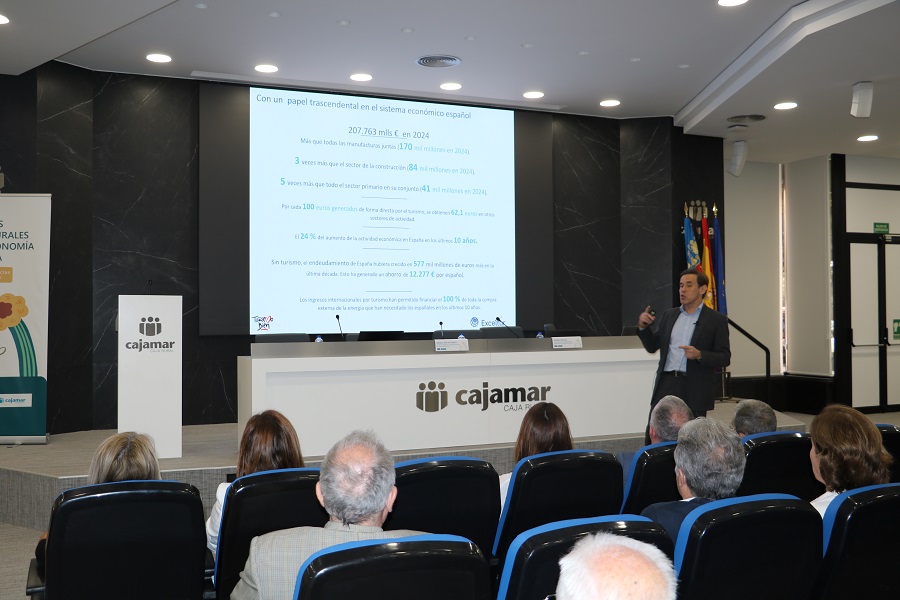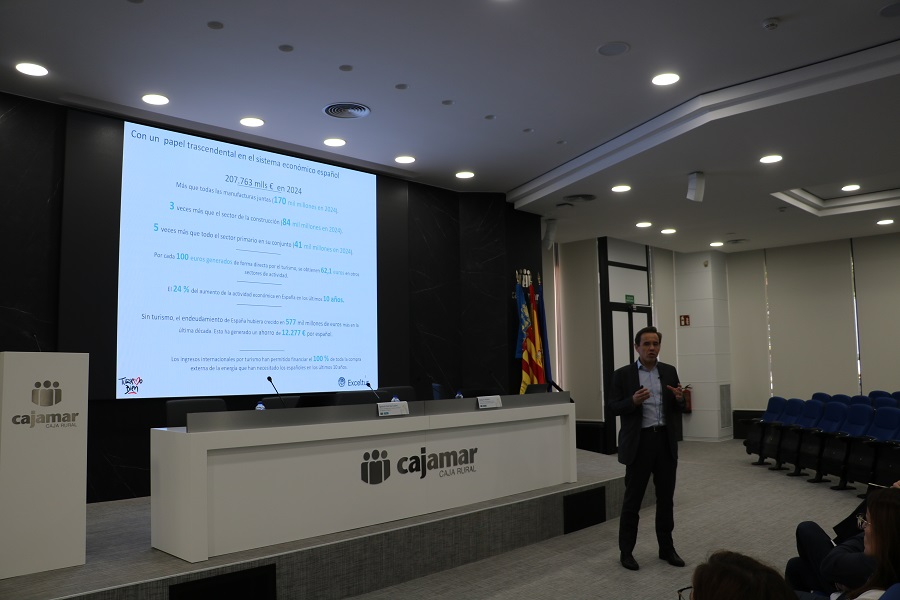Esta web utiliza cookies para que podamos ofrecerte la mejor experiencia de usuario posible. La información de las cookies se almacena en tu navegador y realiza funciones tales como reconocerte cuando vuelves a nuestra web o ayudar a nuestro equipo a comprender qué secciones de la web encuentras más interesantes y útiles.
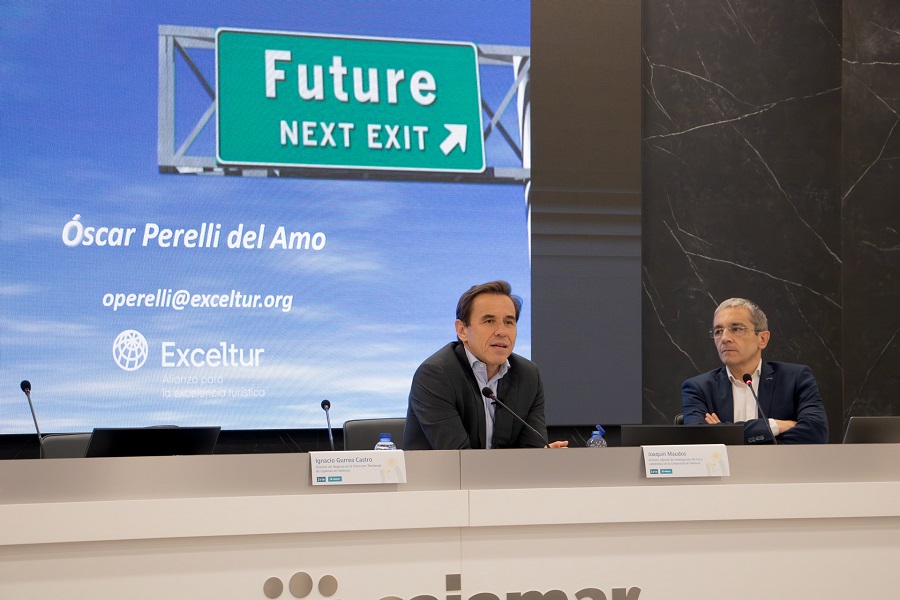
Óscar Perelli: “In ten years, tourist accommodation has nearly matched hotels in terms of capacity, and in some cities, it has even surpassed them.”
The Vice President of Exceltur presented the fourth session of the conference series Los retos estructurales de la economía española (Structural challenges facing the Spanish economy), organized by Cajamar and the Ivie in Valencia.
Tourism was the main driver of Spain’s economy in 2024, contributing €208 billion, or 13% of national GDP, according to Óscar Perelli, Executive Vice President of Exceltur. In his presentation during the fourth session of the conference series Los retos estructurales de la economía española (Structural challenges facing the Spanish economy), organized by Cajamar and Ivie in Valencia, he noted that, according to his estimates, tourism is expected to continue growing and remain a key sector. He indicated that tourism is likely to increase by 4% in 2025, reaching €224.298 billion, which will account for 13.5% of the country’s GDP.
The session was opened by Ignacio Gurrea, Business Director of Cajamar’s Regional Office in Valencia, and Joaquín Maudos, Ivie Research Deputy Director and Professor at the University of Valencia. The conference series includes six in-person sessions that will be held at Cajamar’s headquarters in Valencia during the first half of the year.
According to Perelli, the sector’s challenge is no longer to attract more tourists, but to manage supply effectively. He emphasized the importance of strategic positioning to attract visitors who respect the destination and contribute to the well-being of local citizens. In this regard, he warned of the risks posed by uncontrolled growth, particularly “the overwhelming boom in the conversion of homes into tourist accommodation since 2010, which in just over a decade has nearly equaled hotel capacity.” In 2024, Spain offered 401,893 beds in traditional accommodation and 344,490 in tourist homes. “Any cubicle has become tourist accommodation,” he said, noting that in some cities like Madrid, Barcelona, Malaga, Seville, and Valencia, the supply of tourist homes exceeds that of hotels. In Valencia, for example, tourist accommodation reached 32,879 places in 2024, representing a 29.7% increase over the previous year, compared to 20,225 hotel beds.
According to Perelli, uncontrolled growth of tourist accommodation is one of the reasons for overcrowding in major cities, resulting in public discontent. He argued that these issues cannot be resolved through improvised measures such as vehicle restrictions (e.g., in Ibiza) or tourist taxes with no clear purpose. In his opinion, it is not a question of banning tourism outright, but rather regulating and limiting unlicensed accommodations.
In any case, mass tourism, he noted, is a phenomenon that cannot be reversed. Forecasts suggest that by 2030, the number of tourist trips will double compared to 2010. Since 2019, European consumers have prioritized travel over other durable goods. Spending on hotels and leisure has grown by around 8%, while spending on other items such as vehicles and clothing and footwear has declined by 1.8% and 3%, respectively. In addition, the airline industry expects to double its flights, and there is a growing number of travelers with income and leisure time from traditional European markets, and the rapidly expanding middle class (90% Asian).
For this reason, Perelli insists on the need to reposition the sector, a shift already underway through significant business investment in improving products with greater added value. Since 2019, Spain’s hotel sector has seen a 10% increase in 4- and 5-star accommodations, while lower-category hotels and hostels have declined. These changes have also been led to improvements in employment: temporary employment rate in the sector dropped from 34.7% in 2019 to 7.8% in 2024, below the 13.3% average in other sectors. Salaries have risen by 13.1% since 2019, compared to 10.2% growth in other sectors.
Still, Perelli believes there is still much work to do. The key challenge is to reconcile tourism growth with the well-being of citizens. He said, “We have to choose the kind of tourism we want to attract—not necessarily the wealthiest—but those who are most respectful of the destination, and mindful of their ecological footprint. Tourism must be approached from a territorial strategy perspective and proper supply management. For example, on the coast, public spaces built in the 1960s need to be renovated—a process already underway in some places.”
In urban settings, Perelli emphasized the importance of maintaining the livability in areas under heavy tourist pressure. Tourist accommodation should be limited to legal establishments and traditional businesses should also be protected because their closure also harms the diversity of tourism offering.
He also pointed out that it is important to invest in talent development. Not everyone has to be a university graduate; targeted vocational training is often more effective. It is also important to make the right decisions in communication infrastructure to achieve the desired positioning.
Finally, Perelli underscored the importance of continued promotion—targeted toward specific product niches designed to attract the right kind of tourists. “We’ve started doing this, but we are still far from achieving focused and intensive efforts.”
Investment is needed to address these changes proposed by Óscar Perelli, which call for a strategic rethinking of the sector. However, this investment boost has not been supported by the Next Generation EU Funds, which Perelli described as “a great disappointment.” He said, “They could have been used to reposition Spain’s tourism industry, but instead they were distributed indiscriminately across the country, and, as a result, we now face recurring initiatives that are uncoordinated or even associated with a spending capacity that does not exist and, therefore, cannot be sustained. It was a major opportunity, but it has been squandered.”
Following this fourth conference in the Cajamar-Ivie series, two more are scheduled for June 2025. On June 4, AIReF President Cristina Herrero will present El estado de las finanzas públicas en España: las nuevas reglas del juego (The state of public finances in Spain: the new rules of the game ). The series will conclude with a presentation by Raquel Carrasco, Professor of the Department of Economic Analysis and Quantitative Economics at the Complutense University of Madrid, with a conference on the economic impact of immigration in Spain.


